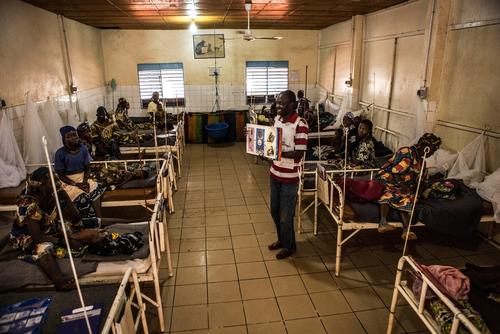Carmen Martínez, mental health advisor, has just returned from a visit to Niger. Here she explains the importance of providing psychosocial support to the children and their mothers or carers in nutritional programmes.
“At the Madaoua hospital, there was a 5-month-old baby who had been there for days. His mother had lost two children and her husband’s family thought it was because of her breast milk, so she decided not to breastfeed her third child. The child was admitted because he was suffering from severe malnutrition with medical complications. The medical recommendation was that he breastfeed while at the same time taking therapeutic milk. The community health worker worked with the mother, listening to her concerns and making her value the doctor’s recommendations. We organised a couple of sessions with her and then her husband’s family came. They all decided that the mother should breastfeed the child and she also accepted to participate in other group activities. At the end of my visit, a few days later, we were already able to see that the baby had improved a lot, as had the relationship between mother and child.”
Special emphasis on nutrition and malaria
In the Tahoua region, in the south of the country, MSF is working in the Madaoua and Bouza districts in order to reduce child mortality, putting special emphasis on nutrition and malaria, the most common diseases.
“Malnourished children also present changes in their behaviour, they are less active, and they are less prone to explore their environment. Their emotions also experience changes as well as their relationship with others; they frequently refuse to interact with other children and adults. These changes feed back into the cycle of malnutrition. For instance, as malnourished children tend to isolate themselves from their environment, it is normal they refuse to eat, further worsening their condition because malnourished children already have less appetite. At the same time, since they interact less with their mothers or carers, all development slows down, making it impossible for children to develop healthily. So it is important to include psychosocial support within the nutritional programmes.”
Managing paediatrics at the community level
The most complicated months for Niger are just around the corner. Malaria and malnutrition cases shoot up between July and October, coinciding with the rainy season and the hunger gap. In order to respond to this peak, MSF is working at community level and managing paediatrics and the nutrition unit at the Madaoua and Bouza referral hospitals. The psychosocial component is present in both inpatient and outpatient care.
“An essential aspect of psychosocial work is to ensure the humanisation of healthcare, taking into account cultural aspects to increase healthcare efficacy. In the hospital, for instance, we have to work with all the staff to ensure that they all know and take care of these aspects. They should inform mothers or carers about their children’s condition, how they will be treated and how the hospital works. They also have to be able to listen to people and resolve their doubts. By humanising care, we provide support to the overall health of the children and their families, not just their physical health. In this way, we are able to improve the efficacy of the programmes.”
Games help development
Severely acute malnourished children with medical complications should be admitted to hospital to receive treatment. Normally, children enter phase 1 of the programme where they receive therapeutic milk and continuous care, and when they begin to improve they pass to phase 2 where they take ready-to-use therapeutic food (RUTF).
“While it is true that with nutritional therapy children’s behaviour generally improves, this is not enough. Psychomotor and sensory stimulation is also needed. This is why, when children are in phase 2, community health workers organise different group activities (both with children alone and also with mothers and carers) in order to promote games that help their development. Groups to enhance child-mother/carer bonding are also organised because we know it is normal for malnourished children to become less and less affectionate. In the hospital, we also work a lot with nutritional assistants who are the people preparing and distributing therapeutic milk and RUTF. They are the ones that spend the most time with the children and their mothers or carers and therefore their role in the programme is important.”
Raising awareness
But the vast majority of severely acute malnourished children, those not suffering from any other disease or medical complication, have been treated for years on an outpatient basis. “In health centres and the communities, MSF community health workers carry out a lot of activities to inform and raise awareness amongst the families about issues related to their health and nutrition, especially of children under 5, the most vulnerable group. In all these initiatives we try to include psychosocial and psycho-stimulation aspects.”
In general, mothers or carers are easily mobilised and usually participate and positively value the psychosocial activities carried out in Bouza and Madaoua. The next step will be to further secure all these activities and be able to provide individual care to treat more personal problems. “In the feeding programmes there are usually many depressed mothers. It is something common to all nutritional projects in different countries and it is very important to be able to identify them in order to be able to treat them.”



